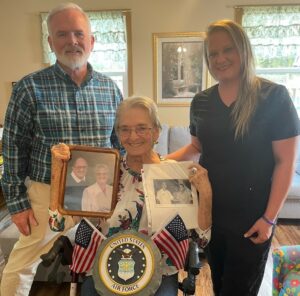The following article was shared by Missouri Chamber member company Veterans Home Care. Have a story to share? Contact Jacob Luecke at [email protected]
Employee absenteeism continues to be a major issue impacting the operational functionality of businesses across the nation. The pandemic and ongoing threats from the Coronavirus have been well documented to cause team members to miss days or weeks of productive work time.
![]() Also contributing to staffing issues is the need for an individual to care for their children and, of growing importance, their elderly parent. As the population continues to age, senior care will become a growing issue for corporate management.
Also contributing to staffing issues is the need for an individual to care for their children and, of growing importance, their elderly parent. As the population continues to age, senior care will become a growing issue for corporate management.
Elderly family members will face a variety of issues ranging from chronic diseases to mental issues to the solitude of living alone, and employees will need to be given the time to deal with it.
The demand for senior care is already putting a strain on the workforce and those who are paid to serve them.
According to the Wall Street Journal, even prior to the pandemic, demand for home-health aides was expected to exceed supply by more than 3 million in the next decade.
The Department of Labor estimates employment of home health and personal care aides is projected to grow 33 percent from 2020 to 2030, much faster than the average for all occupations.
Pew Research Center, indicates nearly half (47 percent) of adults in their forties and fifties are raising a child or children while caring for one or both aging parents. This is known as the “sandwich generation.”
While the stress of caring for an elderly parent will not only affect the caregiver at home but also their work-related responsibilities, there are several options to lessen the burden.
For an elderly parent who served during wartime, a Missouri company, Veterans Home Care headquartered in St. Louis, is helping these seniors secure a little-known VA benefit called the Aid and Attendance Pension.
This pension pays and provides for in-home care for the veteran who served at least one day on active duty during a period of wartime ranging from World War II, the Korean conflict, to Vietnam. Gulf War veterans are eligible with longer service requirements.
Aid and Attendance is available for veterans, or their surviving spouses who qualify. Married couples are only eligible if the veteran is disabled and needs care.
Certain requirements apply including a net worth limit of $138,489 (a primary residence and vehicle are not counted for the net worth limit).
“This benefit is different from the widely known VA compensation payment. Combat duty, overseas service or a service-connected disability isn’t required for the pension,” says Veterans Home Care CEO David Laiderman.
Services are provided based on the patient’s assessed valuation for help with the needs of daily living. These can include assistance with eating, getting dressed, personal grooming, bathing, using the bathroom, moving from one place to another, grocery shopping and more.
The monthly payments of Aid and Attendance are added to the regular amount of the monthly VA pension. It can include several hours per week of in-home care or visits to a center providing adult day care. The maximum amount ranges from about $1,300 to $3,200 per month depending on the applicant’s marital status or status as a veteran’s dependent.
Veterans Home Care, started in 2003, has helped more than 20,000, 65+ aged veterans and their spouses access this benefit through its VetAssist Program. Its business model includes a network of over 4,000 home care providers nationwide who depend on the company’s expertise to connect their senior clients with reliable funding.

Donna Lynn Craft is a seasoned human resources professional at Deerland Probiotics & Enzymes in Forsyth, Missouri. She understands firsthand how accessing VA benefits for in-home care can benefit workers. A nurse at the East Area Agency on Aging referred her family to Veterans Home Care’s VetAssist Program in 2017 to help her family care for their uncle. They were told as a Vietnam veteran he may be eligible for the VA Aid and Attendance benefit
“While at work, I have much less stress knowing someone is there several times a week for Uncle Bud,” says Craft.
Ken Holmes, says he is able to remain in the workforce due in part to the VetAssist Program. “I’m at the age of retirement but having an in-home caregiver for my mother allows me to continue teaching.” Ken’s mother Gaylia Holmes is eligible as the surviving spouse of a wartime veteran.

Veterans Home Care surveyed working family members of senior clients about the VetAssist Program. The responses demonstrate the positive impact of gaining this type of assistance:
Caregivers are protected by many laws and federal regulations. Companies cannot discriminate due to the gender of the employee/caregiver or other factors.
In many cases, for those who served this country, programs like the Aid and Attendance Pension can provide professional assistance to ease the burden on the employee, lessen absenteeism, and thereby benefit the employer. It can play a role helping to solve the growing issue associated with elderly care.
For more information about VetAssist visit https://veteranshomecare.com or [email protected] or call 888-314-6075.